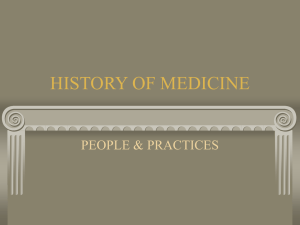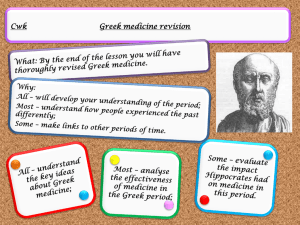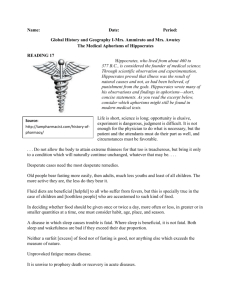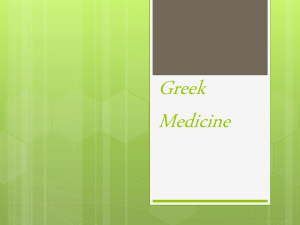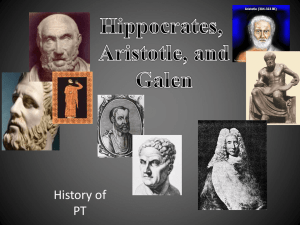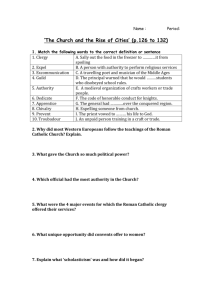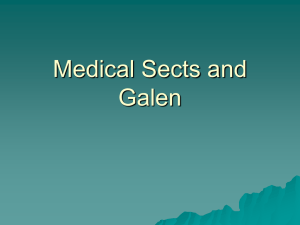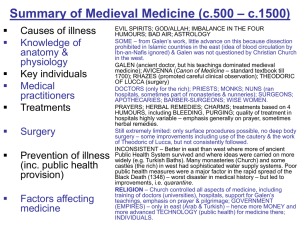File - Ossett History
advertisement
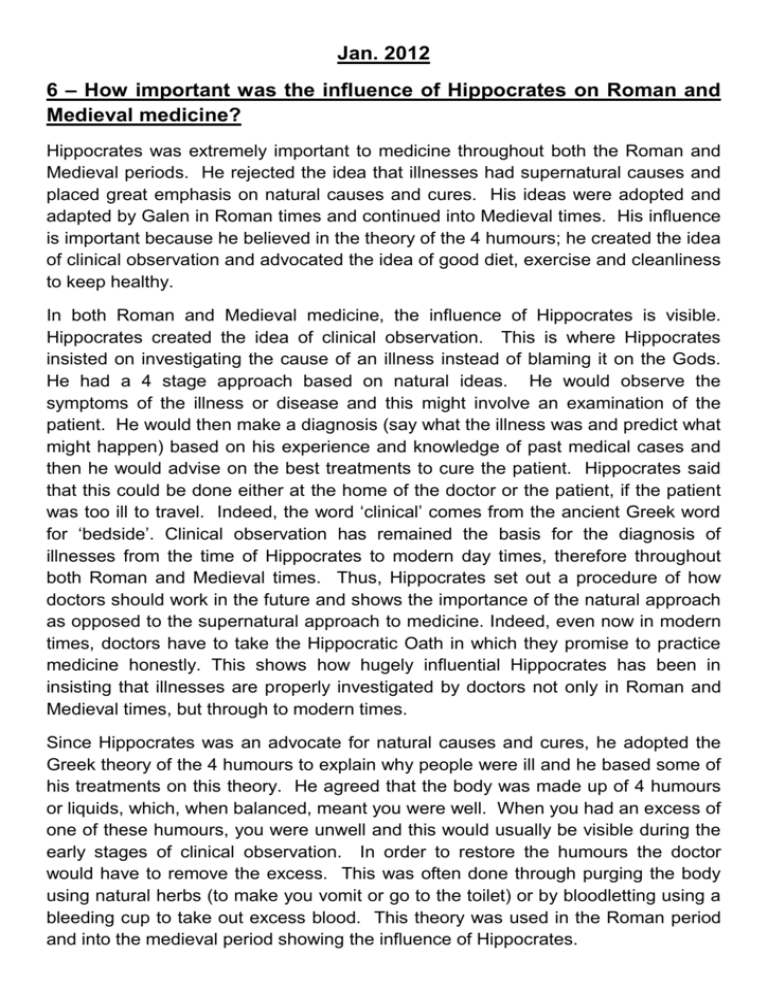
Jan. 2012 6 – How important was the influence of Hippocrates on Roman and Medieval medicine? Hippocrates was extremely important to medicine throughout both the Roman and Medieval periods. He rejected the idea that illnesses had supernatural causes and placed great emphasis on natural causes and cures. His ideas were adopted and adapted by Galen in Roman times and continued into Medieval times. His influence is important because he believed in the theory of the 4 humours; he created the idea of clinical observation and advocated the idea of good diet, exercise and cleanliness to keep healthy. In both Roman and Medieval medicine, the influence of Hippocrates is visible. Hippocrates created the idea of clinical observation. This is where Hippocrates insisted on investigating the cause of an illness instead of blaming it on the Gods. He had a 4 stage approach based on natural ideas. He would observe the symptoms of the illness or disease and this might involve an examination of the patient. He would then make a diagnosis (say what the illness was and predict what might happen) based on his experience and knowledge of past medical cases and then he would advise on the best treatments to cure the patient. Hippocrates said that this could be done either at the home of the doctor or the patient, if the patient was too ill to travel. Indeed, the word ‘clinical’ comes from the ancient Greek word for ‘bedside’. Clinical observation has remained the basis for the diagnosis of illnesses from the time of Hippocrates to modern day times, therefore throughout both Roman and Medieval times. Thus, Hippocrates set out a procedure of how doctors should work in the future and shows the importance of the natural approach as opposed to the supernatural approach to medicine. Indeed, even now in modern times, doctors have to take the Hippocratic Oath in which they promise to practice medicine honestly. This shows how hugely influential Hippocrates has been in insisting that illnesses are properly investigated by doctors not only in Roman and Medieval times, but through to modern times. Since Hippocrates was an advocate for natural causes and cures, he adopted the Greek theory of the 4 humours to explain why people were ill and he based some of his treatments on this theory. He agreed that the body was made up of 4 humours or liquids, which, when balanced, meant you were well. When you had an excess of one of these humours, you were unwell and this would usually be visible during the early stages of clinical observation. In order to restore the humours the doctor would have to remove the excess. This was often done through purging the body using natural herbs (to make you vomit or go to the toilet) or by bloodletting using a bleeding cup to take out excess blood. This theory was used in the Roman period and into the medieval period showing the influence of Hippocrates. Galen was a prominent doctor in Roman times and he not only used Hippocrates’ ideas of natural causes and cures, clinical observation and the 4 humours theory but he also adapted these to create the Theory of Opposites. Galen based a lot of treatments on purging and blood-letting but he also aimed to balance the humours by giving the patient the opposite to what was wrong with them eg if a patient was hot with a fever, then they should eat cold food such as cucumbers. As this theory and Galen’s treatments were based on Hippocrates’ ideas, then this shows that Hippocrates was extremely important in Roman times and because Galen’s ideas were extremely influential in Medieval times, then this means that Hippocrates’ ideas and his influence stretched well into this time as well. Indeed, throughout Medieval times, Galen’s ideas and his books were approved of by the Church and used to train doctors, thus ensuring that Hippocrates was influential in medical training as well as in the causes and cures of illnesses. However, in some ways, Hippocrates was not influential. Galen favoured bloodletting and purging as treatments and these were also the preferred methods in Medieval times, but, although these were connected to the theory of the 4 humours (methods used to restore the balance of the humours), Hippocrates favoured good diet, exercise and rest to allow the body to restore its natural balance, only using these methods as a last resort. Despite Hippocrates’ insistence on illnesses having natural causes and therefore using natural cures, it could be said that he wasn’t very influential because in the Roman period many people still blamed illnesses on the Gods (eg Asclepios) and relied on prayers, lucky charms and visits to the Asclepion to cure them. This was the same in the Medieval period when many people blamed illnesses on the Christian God eg the Black Death, relying again on prayers, visits to shrines and pilgrimages to cure them. This shows that Hippocrates was not very influential at all as people were still relying on the supernatural. Although Hippocrates had written many medical books, it was those books written by Galen in Roman times which were used over the two time periods. Galen’s books survived into the Medieval period and they were approved by the Church. Therefore these books were used in universities and medical schools set up in the C12th and C13th to train doctors and so, it could be argued that although Hippocrates was influential, he was not as influential as Galen as it was Galen who had the greatest impact on medicine in the Roman and Medieval periods.
